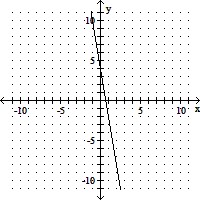Find the x- and y- intercepts. If there are no intercepts write "No x-intercept" or "No y-intercept".x = 4
A. No x-intercept, No y-intercept
B. (-4, 0), No y-intercept
C. No x-intercept, (0, 4)
D. (4, 0), No y-intercept
Answer: D
You might also like to view...
Decide whether the relation is a function, and give the domain and range.
A. Function; domain: (-?, ?); range: (-?, ?) B. Not a function; domain: (-?, ?); range: (-?, ?) C. Not a function; domain: (-?, 0) ? (0, ?); range: (-?, ?) D. Function; domain: (-?, 0) ? (0, ?); range: (-?, ?)
Find the intercepts of the quadratic function.y + 4 = (x + 2)2
A. x-intercepts: (0, 0) and (-4, 0) y-intercept: (0, 0) B. x-intercepts: (0, 0) and (-4, 0) y-intercept: none C. x-intercepts: (0, 0) y-intercept: (0, 0) D. x-intercepts: (0, 0) and (4, 0) y-intercept: (0, 0)
Sin t and cos t are given. Use identities to find the indicated value. Where necessary, rationalize denominators.sin t = -  , cos t =
, cos t =  . Find csc t.
. Find csc t.
A. 
B. - 
C. 
D. 
Multiply. ?
? 
A. -1
B. 
C. 1
D. 